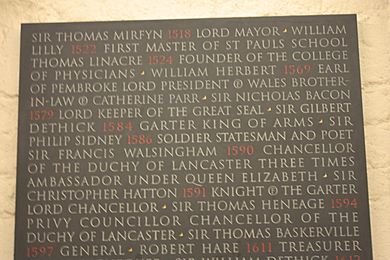William Lily (grammarian) facts for kids
William Lily (born around 1468, died February 25, 1522) was an English scholar who studied classical languages. He wrote a very popular Latin grammar textbook used in England for hundreds of years. He was also the first head teacher, called the High Master, of St Paul's School in London.
Contents
His Life Story
William Lily was born in a place called Odiham, Hampshire, around 1468. In 1486, he started studying at the University of Oxford. After finishing his studies, he went on a long trip to Jerusalem.
On his way back, he stopped in Rhodes. Many Greek scholars had found safety there after their city, Constantinople, was taken over. He then traveled to Italy, where he learned from famous teachers in Rome and Venice.
Teaching in London
When Lily returned to London, he became friends with Thomas More, a very important person at the time. Lily started teaching grammar privately. Many believe he was the first person to teach Greek in London.
In 1510, John Colet, who was the dean of St Paul's Cathedral, decided to start a new school. This school later became very famous. In 1512, Colet chose William Lily to be its first High Master. Colet had first offered the job to a Dutch scholar named Erasmus, but Erasmus said no.
Experts like Ward and Waller said that Lily was one of the smartest Greek scholars in England. Some of Lily's students became very important people, including William Paget and John Leland. St Paul's School became known for its excellent teaching of classical languages.
His Final Years
William Lily died in London on February 25, 1522, because of the plague. He was buried in the churchyard of the old St Paul's Cathedral. Sadly, his grave and monument were destroyed in the Great Fire of London in 1666. Today, there is a special memorial in the cathedral's crypt that lists his name among other important people whose graves were lost.
His Famous Books
Lily is known for being one of the first to teach Greek. But he is even more famous for helping to write a Latin grammar book. This book was used by many generations of students until the 1800s. It was often called the "old Eton Latin grammar" or Accidence.
The Latin Grammar Book
This book, called Brevissima Institutio, was first sketched out by Colet. Then, Erasmus helped to correct it, and Lily worked on it a lot. Two parts of the book were definitely written by Lily. These were poems that helped students remember the genders of nouns and how to change verbs.
Erasmus himself said that William Lily wrote the main part of the book. He said Lily was "a wonderful craftsman in the instruction of boys." Both Lily and Erasmus were very modest. They didn't want their names on the book, so it was first published without an author's name. Colet just wrote a short introduction for it.
In 1534, a version of the book was published called Rudimenta Grammatices. Different parts were added over time, and a final version came out in 1540. In 1542, King Henry VIII made it the only Latin grammar textbook allowed in English schools. This book was used for more than 300 years, with some changes and updates.
It was so widely used that even William Shakespeare knew it well! He mentioned it in his plays, like Titus Andronicus and Henry IV, Part 1. He even quoted from it, saying, "Homo is a common name to all men."
Other Writings
Part of the grammar book is a poem called "Carmen de Moribus." This poem lists school rules in short, clear sentences. It also gives examples of Latin grammar rules. The poem helped students learn about important classical writers like Cicero, Terence, and Virgil.
Later, when John Milton wrote his own Latin grammar book in 1669, he used many examples from Lily's grammar.
Besides the Brevissima Institutio, Lily also wrote other Latin pieces. He translated some works from Greek into Latin, both in prose and poetry. Some of his Latin poems were printed with poems by Sir Thomas More in a book from 1518. He also wrote a book of Latin poems against a rival teacher named Robert Whittington.
Lily's son, George Lily, wrote a short story about his father's life. This was for a historian named Paulus Jovius, who was writing about famous learned men in Great Britain.
 | Claudette Colvin |
 | Myrlie Evers-Williams |
 | Alberta Odell Jones |


